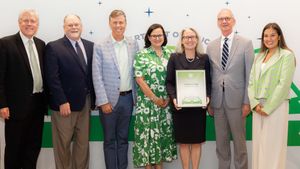
The award is for schools, districts, early learning centers, and postsecondary institutions demonstrating progress in three key areas: reducing environmental impacts and costs, improving health and wellness, and providing effective environmental and sustainability education. Catawba is one of only two honorees from North Carolina this year. The other happens to be Salisbury Academy, thanks to a strong partnership between the two institutions.
“We are immensely proud to be named the only post-secondary recipient in North Carolina, and one of only three in the country,” said Dr. Monica Cowart, Executive Vice President and Provost at Catawba. “This prestigious honor reflects our pledge to the environment and sustainability and reaffirms our ongoing commitment to cultivating responsible citizens. Our students, faculty, and staff continue to lead by example, infusing these initiatives into the culture of Catawba and the community.”
Catawba’s unwavering commitment to sustainability and the environment is reflected in its achievement of full carbon neutrality in 2023, seven years ahead of its 2030 climate commitment. This significant milestone not only sets a high standard for other institutions but also inspires hope for a more sustainable future. A Sustainability Advisory Committee consisting of students, faculty, staff, and trustees provides guidance, generates ideas, networks with partners outside the academic community, and improves buy-in from all groups.
“We have involved our students, faculty, staff, and community members in our shared mission to create a more sustainable world,” said Lee Ball, Catawba’s Center for the Environment Executive Director. “We have integrated environmental education and sustainability into our curriculum and everyday operations helping to reduce our carbon footprint. This recognition reflects the hard work and dedication of everyone at Catawba.”
The campus is home to solar shelters, solar water heating, passive solar facilities, rain barrels, a 5,000-gallon cistern, a bike share program, and numerous LEED-certified residence halls. The dining hall features trayless dining, a hydroponic farm shelf, a filter for converting used cooking oil into biodiesel, recycling, and composting. Sustainability and environmental stewardship are infused throughout the college's operations, culture, curriculum, and outreach, making it a living-learning laboratory.
Catawba students are using applied approaches to sustainability, including projects focused on waste reduction, energy efficiency in dormitories, increased biodiversity on campus, management of invasive species across the region, sustainable forestry, beekeeping, pollinator gardens, and other initiatives linked to professional skills and careers in environment and sustainability.
Courses include Environmental Education and Communication, Sustainability Science and Environmental Policy, Sport and Sustainability, and Environmental Health and Toxicology. Faculty in all disciplines are encouraged to adopt sustainability across their curricula. An Environment and Sustainability degree prepares students to solve the socio-ecological challenges of their lifetimes.
Catawba College provides students with opportunities to spend time outdoors through field labs and supports student clubs that encourage hiking, camping, using the campus low ropes challenge course, and service learning.
On hand for the event at the US Department of Education was U.S. Deputy Secretary of Education Cindy Marten. Keishaa Austin, acting principal deputy director of the Office of State and Community Energy Programs for the U.S. Department of Energy, Brenda Mallory, chair of the White House Council on Environmental Quality, and Janet McCabe, deputy administrator for the U.S. Environmental Protection Agency also congratulated the honorees for their efforts. The Center for Green Schools at the U.S. Green Building Council offered a reception at the National Press Club following the ceremony. In addition, numerous agencies, including the Smithsonian, National Park Service, U.S. Department of Energy, and National Oceanic and Atmospheric Administration offered events throughout the week to connect honoree representatives with more resources and honor their achievements in whole school sustainability.
At the event, 41 schools, 10 districts, three postsecondary institutions, and one early learning center were honored for their innovative efforts to reduce environmental impact and costs, promote better health, and ensure effective environmental education. The honorees were named in April from a pool of candidates nominated by 24 states.
Catawba continues to build on its commitment to sustainability. They were the first college in the Southeast to be certified carbon neutral seven years ahead of their 2030 goal, and the first campus in the US to add Haven solar shelters to their campus. They achieved a Level 4 in the Positive Impact Rating Edition 2024. They were recently designated as a Tree Campus Higher Education by the Arbor Day Foundation and became an affiliate of the Bee Campus USA program. The campus is also home to a solar-powered trash compactor bin from CleanCUBE which holds up to five times more waste compared to traditional bins. Catawba added an electric vehicle (EV) charging station for visitors last fall and is in the process of adding additional charging stations. They also erected a solar sculpture created by Spotlight Solar. The college has completed work on a new geothermal system providing efficient and clean heating and cooling for the Corriher-Linn-Black Library. Catawba’s Ketner School of Business is also launching a new Sustainable Leadership MBA concentration in collaboration with the Center for the Environment and Hurley School of Arts and Sciences.
